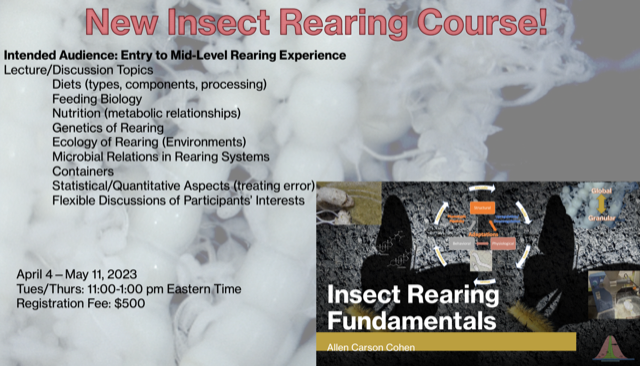Based on feedback from our students from rearing courses over the past 2 years, we are modifying our approach to the online courses. We are now offering a new rearing fundamentals course for entry level rearing background and mid-level background. The course will cover all major aspects of insect rearing systems with emphasis on basics of how components of rearing system function and how they interact.

An important part of the course on Insect Rearing Fundamentals is to give students/participants a better understanding of how various insects feed and how this knowledge helps lead to better rearing techniques. In this example, typical fly feeding dynamics are shown with the larva (in the center) using its hook-type mouthparts to help ingest food after it has been treated by the larva with its digestive enzymes (extra-oral digestion). The adults, especially the one in the upper left, are using their lapping/sponging mouthparts to help them ingest the yeast-based diet and diet matrix of agar and plant materials. This type of feeding applies to many families and species of flies, including the tephritid fruit flies (such as Mexflies and Medflies), which are extensively treated in this course.
This is a sample of the kind of conceptual and detailed explanations that Professor Carson Cohen provides in his lectures. Here are the topics that will be covered in the 12 units (lecture/discussions) in this course:
April 4: Lecture 1: The rearing system concept
April 6: Lecture 2: Diets: Overview of insect nutrition and metabolism
April 11: Lecture 3: Diet components–chemical and physical interactions
April 13: Lecture 4: Diets: Diet-making and diet presentation
April 18: Lecture 5: Diets: Optimization of diet composition
April 20: Lecture 6: Diets: Matching diets with feeding biology
April 25: Lecture 7: Domestication/colonisation (insect genetics and epigenetics)
April 27: Lecture 8: Microbial relations in insect rearing systems
May 2: Lecture 9: More microbial relations (kinds of microbes and kinds of interactions such as mutualism and pathology)
May 4: Lecture 10: Reducing error and stress in rearing systems part 1
May 9: Lecture 11: Reducing error and stress in rearing systems part 2
May 11: Lecture 12: Process control and quality control of reared insects
Each unit will include a 90 minute lecture with a 30 minute discussion section. This structure will allow for generous time for questions and answers that pertain to students/participants’ specific learning needs.
Students/participants will be given access to the NCSU Moodle system which gives access to class notes for each lecture and readings that are supplements to the lectures. The course is not graded, but quizzes will help provide feedback for students/participants to know where they may need explanation from the instructor.
Registration cost of course: $480
